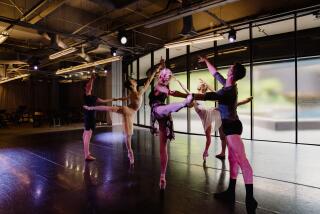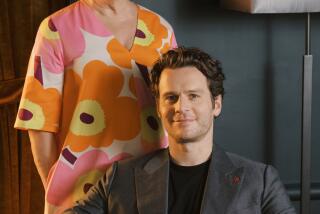MOVIE REVIEW : ‘GINGER, FRED’: DANCING TO A FELLINI BEAT
“Ginger and Fred” (Mann Plaza in Westwood) is another of Federico Fellini’s gorgeous, rich-hued, gigantic living frescoes, peopled with his beloved grotesques and crammed with incident and detail. It marks Giulietta Massina’s first film for her director husband in 20 years. She plays “Ginger,” a widowed grandmother who had once been half of a popular dance team that imitated Rogers and Astaire during World War II. “Fred” is none other than Fellini’s longtime screen alter ego, Marcello Mastroianni.
This first teaming of Massina and Mastroianni is as glorious as it sounds, and for them “Ginger and Fred” is a triumph, even though opinion will surely be divided over whether the same is true of the film.
Carnival and pageant, dream and nightmare float across the screen as an endless procession, beautiful but damned. In a disintegrating, increasingly chaotic and dehumanized world, Massina and Mastroianni represent a vanished romanticism and civility.
They have been summoned to Rome to appear on the Christmas program of a popular TV variety show. The amusing, emotional yet unsentimental reunion of these two after 30 years occupies the film’s foreground; a satire of television’s vulgar excesses and its brainwashing effect on viewers is the background.
It is entirely possible to fall in love with this film because of its stars and its uniquely lush and compelling vision, while still realizing that TV as a target is overly familiar, even for Fellini--and that the film threatens to succumb to the very excesses it means to skewer. Its key symbol is a pig, recurring constantly in the heavy-handed spoofs of commercials (in which sex is used to sell everything conceivable--hardly news) and representative of a humanity mindlessly gorging itself, just like that dead fish at the end of Fellini’s “La Dolce Vita.”
When a smarmy young reporter asks “Ginger” if she might not be too old for a return engagement, we see in the chic, mature Massina the beloved waif of the past. Replying with a resilient shrug and a game, upturned smile, she brings to mind, for an instant, her unforgettable street heroines, the waiflike prostitute of “Nights of Cabiria” and Gelsomina, the innocent clown of “La Strada.”
Massina is bewildered by the swirl of activity that immediately engulfs her upon her arrival in Rome. The TV staffers are rude and indifferent to “Ginger” but she tries to be a good sport, even though realizing soon enough that she’s signed up for a sideshow featuring crude celebrity look-alikes, a transvestite with a passion for servicing convicts, a supposedly levitating monk (played by J. H. Lartigue, the great Belle Epoque photographer), a handcuffed Mafioso and even more inane types, most of whom seem to have stepped out of the pages of the National Enquirer.
“Fred” turns out to be something of a shock too. In contrast to “Ginger,” who’s a hard-working businesswoman, he’s a wheezy, boozy, outrageous old rebel, seedy yet ineffably debonair. “Ginger” knows that she’s agreed to do the show not for the sake of her friends or her grandchildren but for a chance to see “Fred” again. Though gallant, he’s not having any hearts-and-flowers guff, however--he just wants to make a buck.
Yes, we do get to see this “Ginger and Fred” eventually dance--but Fellini milks the big moment for all it’s worth by delaying it with a power-failure blackout on the TV studio’s gaudy neon-and-mirror set. In shimmering white feathered gown and dated blond pageboy wig, Massina is a graceful glider and tapper while Mastroianni is determined but dangerously rickety on his feet. These great star-actors offer a lesson in expressiveness as they toss off a look, a shrug, a gesture, each of them perfect--and all adding up to a gracious acceptance of mortality. And what Mastroianni does with his hands while dancing is so enchantingly witty and graceful that we’re distracted from what his feet can only try to do.
Once again, Fellini has surrounded himself with such familiar and gifted collaborators as writers Tonino Guerra and Tullio Pinelli, cinematographers Tonino Delli Colli and Ennio Guarnieri, production designer Dante Ferretti, costume designer Danilo Donati and composer Nicola Piovani, whose score is securely in the seductive, romantic tradition of the late Nino Rota. Franco Fabrizi, the star of “I Vitelloni” (1953), one of Fellini’s finest films, plays the unctuous, peroxided and bespangled television host.
Like many other Fellini films, “Ginger and Fred” (rated PG-13 for some blunt talk) is scarcely free of self-indulgence. (One viewer remarked that watching it was like being stuffed with French pastry, which may well be the effect Fellini intended.) Fellini hasn’t anything all that original to reveal about TV and its mindlessness as an opiate of the masses. But his view of the human comedy remains wise and compassionate--even as it grows ever more pessimistic. As a Hollywood director said the other day, “Fellini succeeds and fails on a level to which most of us can only aspire.”
‘GINGER AND FRED’ An MGM release of a co-production of PEA Produzioni Europee Associate S.r.l. (Rome)/Revcom Films S.A. in association with Les Films Arianne and with FR3 Films Production (Paris)/Stella Film in association with Anthea (Munich) and with the collaboration of RAI Uno. Producer Alberto Grimaldi. Director Federico Fellini. Screenplay Fellini, Tonino Guerra, Tullio Pinelli; from a story by Fellini and Guerra. Camera Tonino Delli Colli. Music Nicola Piovani. Production designer Dante Ferretti. Costumes Danilo Donati. Choreographer Tony Ventura. Film editors Nino Baragli, Ugo De Rossi. With Giulietta Massina, Marcello Mastroianni, Franco Fabrizi, Frederick Ledebur, Augusto Poderosi, Martin Maria Blau, Jacques Henry Lartigue, Toto Mignone.
Running time: 2 hours, 6 minutes.
MPAA rating: PG-13 (parents are strongly cautioned that some material may be inappropriate for children under 13).
More to Read
Only good movies
Get the Indie Focus newsletter, Mark Olsen's weekly guide to the world of cinema.
You may occasionally receive promotional content from the Los Angeles Times.










